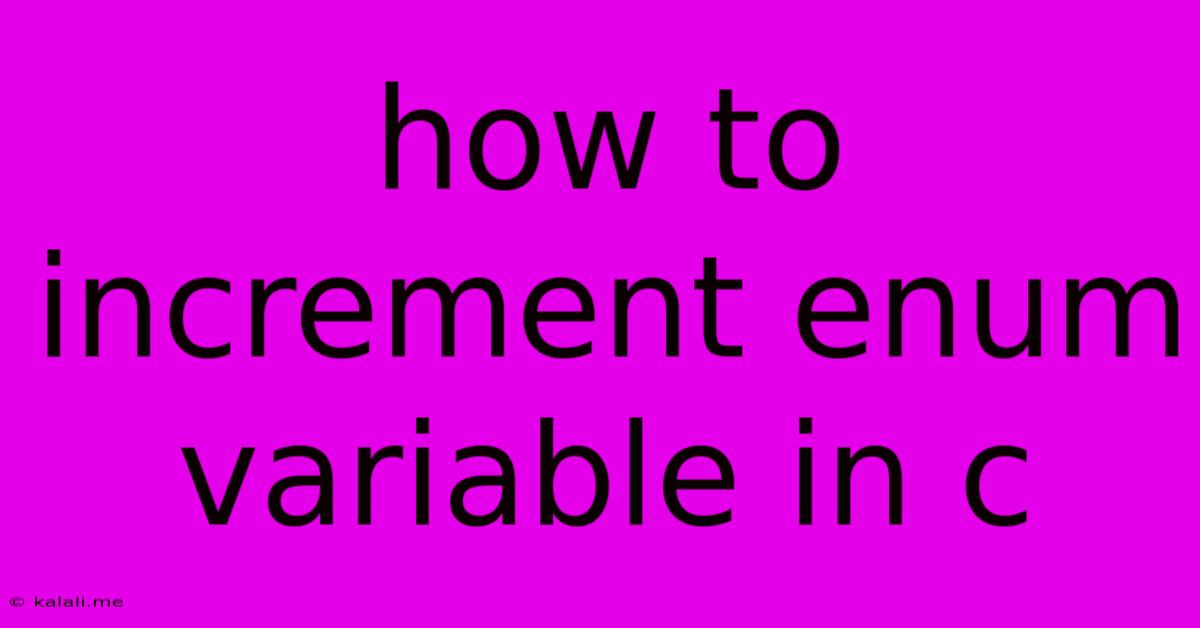How To Increment Enum Variable In C
Kalali
May 29, 2025 · 3 min read

Table of Contents
How to Increment an Enum Variable in C
This article explores the nuances of incrementing enum variables in C. While C doesn't directly support incrementing enums like you might in other languages, we'll cover several techniques to achieve the desired effect, highlighting their strengths and weaknesses. Understanding the underlying representation of enums is crucial for safe and efficient manipulation.
Understanding Enum Representation in C
Before diving into incrementing techniques, it's important to remember that enums in C are essentially integer types. The compiler assigns integer values to each enum member, starting from 0 by default, unless explicitly specified. This integer representation is key to manipulating enum variables. For example:
typedef enum {
RED,
GREEN,
BLUE
} Color;
In this example, RED would typically have a value of 0, GREEN a value of 1, and BLUE a value of 2. However, you can explicitly assign values:
typedef enum {
RED = 10,
GREEN = 20,
BLUE = 30
} Color;
Now RED is 10, GREEN is 20, and BLUE is 30. This explicit assignment impacts how you'd increment.
Methods for Incrementing Enum Variables
There are several approaches to effectively "increment" an enum variable, each with its own implications:
1. Direct Integer Increment
The most straightforward method involves treating the enum variable as an integer and incrementing it directly. This approach is simple but requires careful consideration of the enum's underlying values and potential overflow.
#include
typedef enum {
RED,
GREEN,
BLUE
} Color;
int main() {
Color color = RED;
color++; //Incrementing as an integer.
printf("Incremented color: %d\n", color); // Output: 1 (GREEN)
color++; //Incrementing again.
printf("Incremented color: %d\n", color); // Output: 2 (BLUE)
color++; //Incrementing beyond the defined enum values.
printf("Incremented color: %d\n", color); // Output: 3 (Undefined)
return 0;
}
Caution: Incrementing beyond the last defined enum member leads to undefined behavior. The resulting value won't represent a valid enum member.
2. Using a Switch Statement (for controlled increment)**
For more controlled incrementing and to handle potential overflows gracefully, a switch statement offers a robust solution. This method allows you to define the behavior when reaching the end of the enum.
#include
typedef enum {
RED,
GREEN,
BLUE
} Color;
int main() {
Color color = RED;
switch (color) {
case RED:
color = GREEN;
break;
case GREEN:
color = BLUE;
break;
case BLUE:
color = RED; // Cycle back to RED.
break;
default:
printf("Invalid color value.\n");
}
printf("Incremented color: %d\n", color); // Output: 1 (GREEN)
return 0;
}
This approach ensures the incremented value always remains within the defined enum range, cycling back to the beginning if necessary. It provides better error handling and maintainability compared to direct integer increment.
3. Creating an Increment Function (for modularity and readability)**
To enhance code modularity and readability, especially for larger enums, consider creating a dedicated increment function. This function can encapsulate the logic for incrementing and handling boundary conditions.
#include
typedef enum {
RED,
GREEN,
BLUE
} Color;
Color incrementColor(Color color) {
switch (color) {
case RED:
return GREEN;
case GREEN:
return BLUE;
case BLUE:
return RED;
default:
return RED; // Or handle the error appropriately.
}
}
int main() {
Color color = RED;
color = incrementColor(color);
printf("Incremented color: %d\n", color); // Output: 1 (GREEN)
return 0;
}
Choosing the Right Approach
The best method depends on the specific context and the desired behavior. Direct integer increment is the simplest but least robust. The switch statement and a dedicated increment function offer better control, error handling, and code readability, especially when dealing with complex enums or the need for cycling through enum values. Always prioritize code clarity and maintainability. Remember to carefully consider potential overflow and handle it gracefully to avoid unexpected program behavior.
Latest Posts
Latest Posts
-
To Obscure Or Block Out Light
May 30, 2025
-
Toilet Bowl Not Filling All The Way
May 30, 2025
-
How To Cite Poste Rpresentations That Werent Published
May 30, 2025
-
What Are Lighter Flints Made Of
May 30, 2025
-
Malaylam Vs Tamil Which Is Easier
May 30, 2025
Related Post
Thank you for visiting our website which covers about How To Increment Enum Variable In C . We hope the information provided has been useful to you. Feel free to contact us if you have any questions or need further assistance. See you next time and don't miss to bookmark.